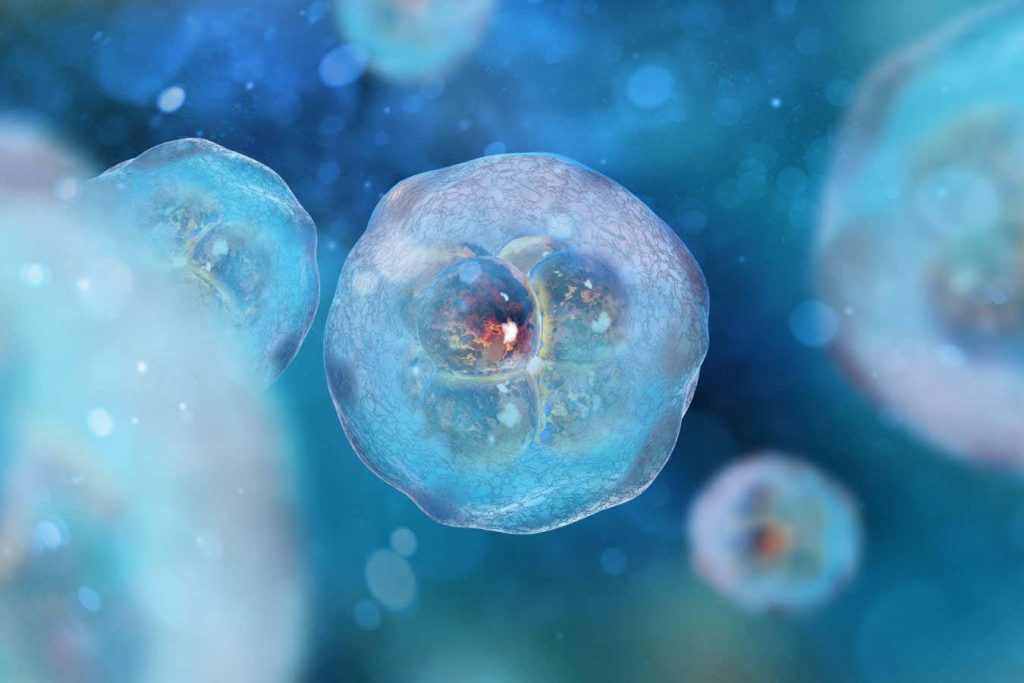The “synthetic embryos” have been created from stem cells grown in the lab
Andrew Vodolazhskyi/Alamy
A team at the University of Cambridge has announced making the first human “synthetic embryos” – embryo-like structures made from stem cells – that have been grown to a stage equivalent to just past 14 days old, the legal limit to study natural embryos in the UK. The work could help researchers study the causes of early miscarriages and understand how organs develop, but some scientists want to tighten regulations covering this field.
What are synthetic embryos?
The term is somewhat misleading as these structures aren’t really synthetic, nor are they exactly the same as embryos. They are similar to early embryos, a tiny ball of cells arising from a sperm fertilising an egg, but created from stem cells grown in the lab.
These structures haven’t been wholly synthetically created, as the stem cells came from an embryo originally, and they seem to have certain differences to naturally formed embryos. Some therefore prefer to call these entities stem-cell-based embryo models.
Advertisement
How much of an advance is this?
Until recently, only synthetic embryos made from animals such as mice and monkeys had been made, although Magdalena Żernicka-Goetz at the University of Cambridge had made it public that she was developing their human equivalents. On 14 June, she announced her team had grown the human versions to a stage at which a real embryo would implant into the uterus and start developing some different tissues, including the precursors of cells that go on to form sperm and eggs.
“In real embryos this [is equivalent to] a stage between day 7/8 and day 14,” says Żernicka-Goetz. She presented her work at the International Society for Stem Cell Research’s annual meeting in Boston, Massachusetts, as reported by The Guardian, but hasn’t yet published the full report in a peer-reviewed paper
Why make synthetic embryos?
One reason is they can be made in unlimited numbers, while spare IVF embryos, which are used in early developmental research, are in short supply. All embryos in a batch made from the same stem cells are also more or less genetically identical, which is of great use for studying their response to different experimental conditions. It is also quicker and easier to genetically modify stem cells grown in a dish to understand the functions of different genes.
Any other benefits?
One key advantage is that in most countries – including the UK and US – natural embryos studied in a dish must be destroyed after 14 days, to avoid ethical issues around working with something that could, in some circumstances, grow into a fetus. These rules don’t apply to synthetic embryos, so this could let researchers study embryo development for longer, a landmark step towards better understanding organ development and the causes of early miscarriages.
Should we make new rules that apply to synthetic embryos?
These are already being drawn up in the UK, but nothing has been announced elsewhere, including in the US. In the UK, scientists, such as Żernicka-Goetz, have formed a working group along with legal experts, patient representatives and ethicists to discuss what new rules should apply. The group has submitted recommendations to the UK’s Human Fertilisation and Embryology Authority, which regulates research involving natural embryos and will probably take on responsibility for synthetic embryos.
Policymakers may consider making a cut-off based on the developmental stage the synthetic embryo has reached rather than a certain time limit like the 14-day rule, says James Briscoe at The Francis Crick Institute in London. “Perhaps the threshold will be the formation of a certain organ system.”
What would happen if synthetic embryos were transferred into a uterus?
We don’t know because it has never been done, and it would be illegal. But animal research by a Chinese team suggests it would not, in the current state of the field, lead to pregnancy. When monkey synthetic embryos were created and transferred into eight females, a pregnancy seemed to begin in three of the individuals, but after a few days the pregnancies miscarried, it was reported in April.
This may be because synthetic embryos aren’t identical to natural ones. “We can’t assume they completely recapitulate human embryonic development,” says Roger Sturmey at Hull York Medical School, UK.
How might synthetic embryos help advance medicine?
They should help us understand more about early embryonic development. We can’t see precisely what is going on inside the uterus at any stage of pregnancy and the 14-day rule prevents human embryos past this stage being studied in the lab. “That period is a black box,” says Sturmey.
Learning about this process may shed light on what goes wrong when early pregnancies miscarry. It could also help us understand how embryonic organs form and grow, which one day could lead to doctors being able to grow organs in the lab for transplants.
Article amended on 16 June 2023
This article has been changed to better explain the time that the synthetic embryos were allowed to grow until.
Topics:

